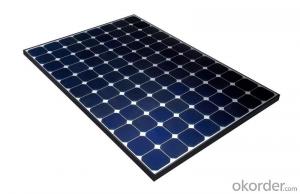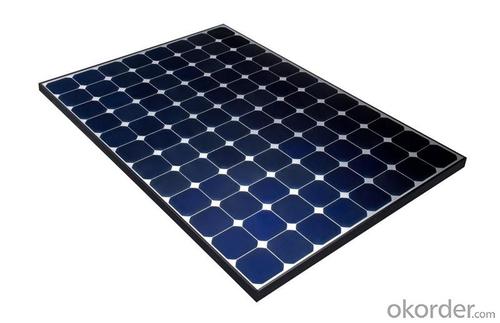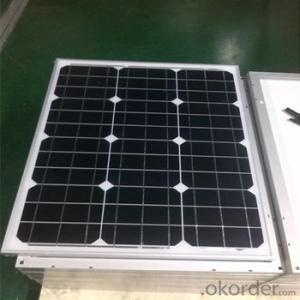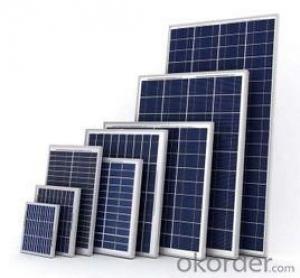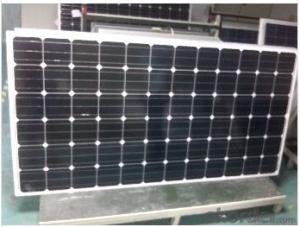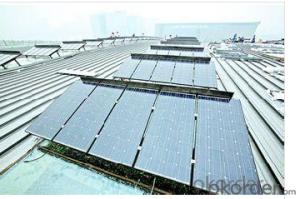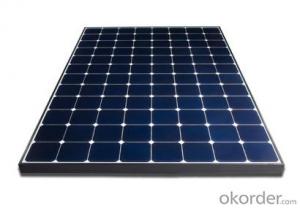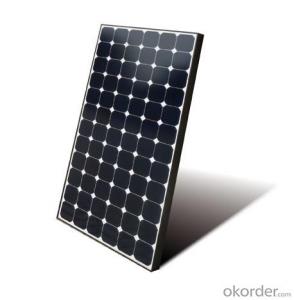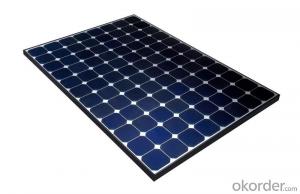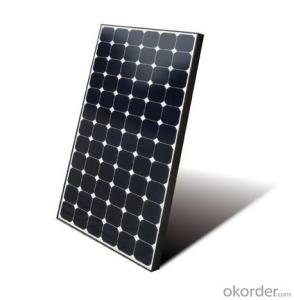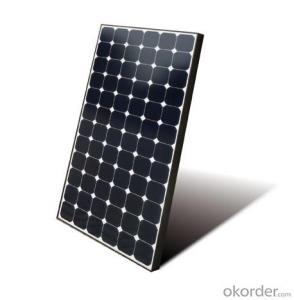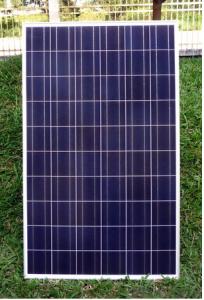Solara Solar Panels - CNBM Poly 185W Solar Panel with TUV UL CE Certificate for Residential
- Loading Port:
- Shanghai
- Payment Terms:
- TT OR LC
- Min Order Qty:
- 500 watt
- Supply Capability:
- 1000 watt/month
OKorder Service Pledge
OKorder Financial Service
You Might Also Like
Specification
CNBM Poly 185W Solar Panel with TUV UL CE Certificate For Residential
Introduction
Electrical connections are made in series to achieve a desired output voltage and/or in parallel to provide a desired current capability. The conducting wires that take the current off the modules may contain silver, copper or other non-magnetic conductive [transition metals]. The cells must be connected electrically to one another and to the rest of the system. Externally, popular terrestrial usage photovoltaic modules use MC3 (older) or MC4 connectors to facilitate easy weatherproof connections to the rest of the system.
Each module is rated by its DC output power under standard test conditions, and typically ranges from 100 to 365 watts. The efficiency of a module determines the area of a module given the same rated output – an 8% efficient 230 watt module will have twice the area of a 16% efficient 230 watt module. There are a few solar panels available that are exceeding 19% efficiency. A single solar module can produce only a limited amount of power; most installations contain multiple modules. A photovoltaic system typically includes a panel or an array of solar modules, a solar inverter, and sometimes a battery and/or solar tracker and interconnection wiring.
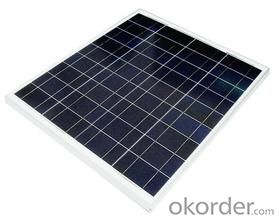
Suggested application
Home lighting business lighting,
Garden lighting, pavement lighting
Farmer household lighting
Decorative water pump
Traffic signal lighting
Industry area
Business area
Solar Power Plant
Product feature
Modules are made of Monocrystalline or Polycrystalline Silicon cell.
Materials and color of the solar panel frame: Clear anodized aluminum alloy type 6063T5 Universal frame; Silver-white color;
The output connection gathers the coupling: Selects conforms to the IEC-612615; 2005, class II, IEC61730 international standard; Airtight waterproofing binding clamp;
Module seal structure: The surface is thick, the high diaphanous rate armored glass with solar cell board special-purpose 3.2mm becomes after the high temperature lamination craft. The back selects has waterproof and anti- aged performance fine TPT materials. The entire block battery board has, the waterproofing, the anti- aging airtight and so on the fine performance;
Power tolerance: +/-3%
Packaging
International standard cartons (according to the requirements of customers)
- Q: What does it take to install the solar panel? Cable wires to power source or fuse box? Anything else?How does the cable wires stay on the solar panel?
- How does the cable wires stay on the solar panel? With wire retention clips (4 per module) that are used to wrap the wire on the underside of the module frame. The home run cables to the transition box (converts between types of wire with no electrical transformation occuring) or combiner box (joins multiple source circuits in parallel, with the positives fused for safety) are usually tied along the racking system components, and with conduit sections used as needed. Racking is another big part of the installation. Don't just make your own homemade wooden rack, as these will weather away to nothing very easily, and cause great failures. GET a professionally designed metal racking system. PV modules are EXPENSIVE. Don't let the racking system cause them to break. It also requires the inverter, if you intend it to connect to the main electric service. If using multiple inverters, you need an AC combining panelboard to join them prior to entering the main electric service. Otherwise, you need to think about how else you might be using them. If you are charging batteries, you need a charge controller.
- Q: hi,i have 4 solar panels. I can get 9V 400mA when i wired them parallel. The question is: how can i make a regulator circuit to store power into batteries.
- wire them in series parallel to get 8 volts at 200 mA, and that should charge a 2 volt battery. You may want to put in a series diode to prevent the battery from discharging into the panel when the sun is out. At 200 mA, depending on the battery size, you may not need much control, as that low a current will not overcharge a large battery, like a small auto battery. In fact it will take a very long time to charge it. edit: But do i need to add a regulator? If by that you mean a voltage regulator, no, as a solar panel has a high output resistance, and that will limit the current into the battery. If you mean a charge controller, if the battery is small, you may need a charge contoller to avoid overcharging the battery. But that is not a voltage regulator. .
- Q: We are thinking about useing solar panels for our house.Does anyone know about solar panels? If so could you please tell me some information on them,and the cost for a home,to install them.
- If solar power is not practical, why do four of my friends and I have it? Actually Don M is mostly right. The factors to consider when contemplating a solar installation are numerous. For example my system will not pay for itself in utility savings in my lifetime, but I plan to sell the house soon. What I am saving on electricity costs, and the increased amount I can ask a buyer, I will come out well ahead. Cruise the Internet and look in the green search box at the top of this page, for solar panels. As you learn more, you can come back with more questions.
- Q: When you add a load resistor to a PV panel (Solar panel) of 00 ohms what happens to the voltage produced from the cellAlso, as the resistance increases, how does this affect the output voltage
- Photovoltaic cells have a load curve that gives the power conversion based on the current drawn. This makes it harder to calculate. For instance, at infinite resistance, the solar cell will have a peak voltage that produces no power (P=I*V=V^2/r). At short circuit, the voltage collapses to essentially nothing and so the power is almost nothing. There is an optimal load (sweet spot) where the resistance applied will draw the most power out of the cell while not overloading it. This measure is either given by the manufacturer or found experimentally. Upon taking a lit panel that has no load and applying a 00 ohm resistance, the voltage will drop. By how much is entirely dependent on the array layout and specific cell characteristics. As the resistance drops from the optimal load point, the voltage collapses fairly sharply. As the resistance increases from the optimal load point, the voltage will rise more at first and then level off to the peak or no-load voltage.
- Q: Can solar panels be installed in areas with high winds?
- Yes, solar panels can be installed in areas with high winds. However, it is crucial to consider the design, installation, and maintenance of the solar panel system to ensure its durability and stability in such conditions. Reinforcements and proper anchoring techniques can be employed to withstand the wind load and prevent any damage to the panels.
- Q: all i want to do is provide enough electricity for 2 fluorescent bulbs i was looking at some 80 watt panels how many of those would i need and what else do i need for storing the electricity for use at nite? and how much would it all cost?
- The solar panels are made in China because there are fewer environmental regulations and cheap coal power. It takes a lot of energy to melt silicon and there are toxic waste products. It would be three to five times more expensive to make the panels in the US ( three times is just for reprocessing the toxic wastes ). Solar cell made in China are about $2 a watt, perhaps as low as $ a watt but in truth the claims for $ a watt or less solar panels as in thin film solar panels have much lower efficiency and require perhaps ten times more surface area.
- Q: Photo-Voltaic solar panels are very expensive. Most of a home's energy needs are for heating water, heating and air-conditioning. All of these can be met with thermal solar collectors which are much less expensive. The thermal solar panels would heat water stored in a hot water tank which then can be used as hot water, to heat the home, or as the heat source to a Lithium Bromide Absorption chiller to air-condition a home. With the base line needs met without expensive panels and without inefficient energy conversions, only a small Photo-Voltaic array would be needed for the remaining power needs and since those needs are variable, there would still be power to sell to the grid.
- Just read some of the other posts and I am surprised at the answers. Solar thermal systems typically have a payback of less than seven years on residential system without the tax break. A complete system can be installed for about 5k or less. Compare that to 20k or more for PV with a fifteen to twenty year pay off. Each home and area is different so a site evaluation must be done for exact figures and pay offs. I am going off my own experience in my above statements Flat panel collectors work well in most areas for DHW. Evacuated tubes often run too hot which works well for some applications or high usage. Heating water is the single greatest energy usage other than space heating and cooling. It often surpasses the two above systems based on its widespread usage(every houshold in USA has one) and its the amount it is used(24/7@365) The amount of energy spent to heat water is by order of magnitude the greatest number out there. Having a solar thermal system providing hot water for a average American household is equivalent to taking 40,000 miles off the freeway in a car every year. The BTU's required to heat the water is huge. So why is this more developed cheaper and more efficient technology behind PV in awareness? Natural Gas the number one choice for heating water is cheap. It's by product is invisible and misunderstood. What I find fascinating is if you look at the increase in Natural Gas vs Electricity you will be surprised by how much it has jumped in the last seven years. It is not talked about nearly as much as electricity It does not get the same level of press that PV does. So in short the answer is cheap Natural Gas prices and public perception of this product have kept it off the list of many that are turning toward the green trend. It is less sexy than watching your meter spin backwards. It is the best improvement at the best cost except for conservation which is and was the most cost effective energy saving that can be employed
- Q: Can solar panels be used in areas with high levels of windstorms?
- Yes, solar panels can be used in areas with high levels of windstorms. However, it is important to ensure that the solar panels are properly installed and secured to withstand the strong winds. Additional measures such as reinforced mounting structures and regular maintenance can also be taken to enhance their durability in such conditions.
- Q: Due to erratic power cuts in my area I want to make up by using a 30watt solar panel. My decoder is 30watt but my TV is 70W. I need something small. I don't have problem with sound. Just picture.
- Do what we do when power is cut (although we have very reliable power - we loose as much as 2 hours a year), is go Amish. That is go without powered technology. Now, for you, you need more than a solar panel (and likely more than 30W, but that is a start) - you need a battery or set of batteries to store the collected power. 20Ah might do. You need an inverter to power things. For that, likely a 300W will do. For a TV, go shopping, and look at the labels on the back of the TVs. I just bought a 24 TV rated at 40W. If you get a 9 LED TV, it may be likely you can run that directly from battery, for many have separate DC brick supplies. With those, you can make a cable to power it directly from a 2V or so battery, if the supply can make 2 to 5V. Depending on your provider, you may be able to get a mini-decoder which uses a separate brick or wall supply, which means the decoder likely can be directly battery powered. Such a decoder may draw less than 20W.
- Q: what percentage of sunlight is converted into electrical energy in a solar panel?
- Around 20%
Send your message to us
Solara Solar Panels - CNBM Poly 185W Solar Panel with TUV UL CE Certificate for Residential
- Loading Port:
- Shanghai
- Payment Terms:
- TT OR LC
- Min Order Qty:
- 500 watt
- Supply Capability:
- 1000 watt/month
OKorder Service Pledge
OKorder Financial Service
Similar products
Hot products
Hot Searches
Related keywords
